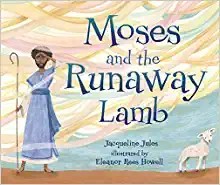The title of Jacqueline Jules’s highly recommended new novel-in-verse reflects the ironies of growing up Jewish in a small southern town in the mid – twentieth century. Trudie Hamburger has loving parents and close friends. Her father’s German accent and her family’s obvious distance from their church-attending neighbors present challenges; and she is ostracized for her seemingly odd last name. While Trudie’s Jewish home life and synagogue attendance strengthen her identity, the near erasure of her father’s traumatic past leaves a gap in her understanding. Jules’s tone is understated, invoking a specific time and place, but it encourages today’s young readers to identify with and learn from Trudie’s experience.
Adults sharing this middle-grade novel with their children and students will connect with cultural touchstones of the era, from popular music to books. Jules, a librarian as well as an author, captures the literary tastes of a bookish girl, with references to the Half Magic series and biographies of iconic women. Young readers, even if unfamiliar with these allusions, will appreciate the way that the book places Trudie’s dilemma in an era that is different but still recognizable. Trudie feels hurt when other girls exclude her, frustrated by injustices that appear in school and at home. Not only that, her mother’s constant attention to Trudie’s younger brother, who was born prematurely, provokes some resentment.
The antisemitism at the core of the story is not violent, nor is it obviously menacing. It is a painful subtext underlying Trudie’s emotional responses. Her last name matches the most identifiably American food and, at the same time, marks her as foreign. Some of the prejudice she encounters is passive, such as the classmate who will not invite her to an exclusive country club. But one fellow student hurls taunts at her, comparing her to “chopped meat.” Worse, adults in positions of authority sometimes abuse their power. The music teacher exiles Trudie from class rather than modifying her selections of Christian songs. Even though Trudie finds refuge in the library with Mrs. Bryan, who encourages and supports her, her isolation differentiates her from the rest of her community. When an Asian American boy moves to the town, he and Trudie bond over their love of reading, and she also finds the courage to challenge his marginalization.
Hoping to protect her, Trudie’s parents have left a great deal unsaid about the missing members of her father’s family. She questions the vague explanation that “Daddy’s family didn’t ‘make it out.’ No one wants to explain to kids what that means.” Trudie is torn between her determination to one day learn the truth and her desire to spare her father any further suffering. As the story’s events unfold, Trudie’s family, and even some of their neighbors, are forced to recognize the dangers of projecting their fears onto anyone perceived as different. As a result, Jules strikes a careful balance between a universal message and Trudie’s individual environment. The awkward dissonance between her name and the place she calls home does not defeat her; readers know that she will put past and present together and find her way forward.
Emily Schneider writes about literature, feminism, and culture for Tablet, The Forward, The Horn Book, and other publications, and writes about children’s books on her blog. She has a Ph.D. in Romance Languages and Literatures.





